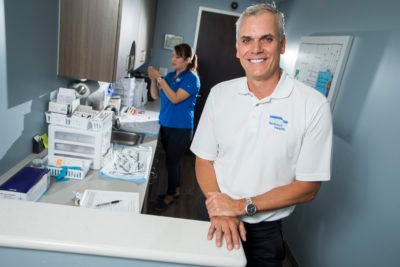Medical director of national healthcare company gets to heart of the issue, sheds light on complexity, true costs and employer solutions
SCOTTSDALE, Ariz. – (Jan. 23, 2017) – With a new Administration and clashing viewpoints on the success and viability of the Affordable Care Act, many Americans believe the next president holds the future of healthcare in his hands. Redirect Health, a national healthcare company based in Scottsdale, Ariz., contests this view.
“Whether it’s Obamacare, Trumpcare or some other variation, it doesn’t really matter,” said Janice Johnston, M.D., medical director and co-founder of Redirect Health. “We won't fix the healthcare system by focusing on how much government must do – and how much the government must subsidize – to fix a broken system. The solution is much simpler: we can fix the system by unraveling its complexity and making true costs transparent."
Redirect Health transformed the traditional healthcare model for employers by putting healthcare first and insurance last, eliminating the waste, administration and profit margins built into traditional health insurance plans. A complement to self-funded plans, Redirect Health offers business owners a healthcare plan that includes unlimited primary care, chiropractic, preventive visits, labs, immunizations and 24-7 access to a physician. The plan costs $105 per employee per month, with $0 copay and $0 deductible. Employers purchase stop-loss insurance to cover catastrophic or complex diagnoses and injuries.
“Redirect Health has shown that this model is a viable solution for the issues in healthcare today – regardless of what happens with the ACA,” added Dr. Johnston.
To that end, Dr. Johnston addressed four common questions about the future of healthcare under President Donald Trump, shedding light on cost, value, transparency and consumer disillusionment:
- How will healthcare differ if the ACA is repealed?
For decades, individuals and employers have been forced into a health insurance model. They choose their plan and pay monthly premiums, whether or not they access care. When they do require services, they pay even more for copays and deductibles. For ordinary people this model didn’t work before the ACA, and it won’t work after.
Americans increasingly can’t afford basic healthcare, and they refuse it as a result. When their situations worsen, they end up receiving treatment in a hospital. Care in hospitals – whether a high level of care is needed or not – can be five-to-30 times higher than in a doctor’s office or clinic, even for the exact same services.
The best solution is to help members navigate the system away from unnecessary hospital services, eliminate co-payments and deductibles for basic health services, and provide full cost transparency so consumers can make better choices.
At Redirect Health, we don't believe traditional insurers will achieve this – their profitability is enhanced by this confusion, administration and excess in the industry – so we set out to do it ourselves.
- How can Americans break out of the insurance-first cycle?
Reducing the complexity of healthcare is the key to reducing costs and getting the right care at the right price. Self-insurance is gaining popularity among companies of all sizes, as this model gives control back to businesses and their people. A smart self-funded plan paves the way for a highly functioning healthcare delivery system, and allows purchasers and users to save money, time and hassle.
Companies that self-fund create their own benefit plans and pay claims directly, or work with a third-party administrator to handle claims and administrative responsibilities. Benefits can include medical, dental, vision, prescription medications and workers' compensation, and plans can be customized to the workforce’s needs.
Employers may also tap a partner like Redirect Health to serve as a healthcare concierge. Material savings occurs by bringing together primary care, chiropractic, preventive visits, laboratory services and 24-7 support to help our members navigate the system. This creates synergies that protect employers from overpaying and ensure members get the care and experience they need.
- What tools will simplify access and bring down the cost of care?
Commonsense low-tech technology is key to providing simple, convenient, 24/7 access to routine healthcare and will amplify the impact of the "healthcare first, insurance last" model.
For example, the ability to connect via phone to the healthcare team and doctor with a complete and updated electronic medical record at their fingertips is an essential solution in addressing basic health needs in a convenient and cost-effective way. When our members are sick or injured, they contact a care logistics specialist who quickly evaluates their needs and determines the next steps in a treatment plan – no more not knowing and guessing. More than 70 percent of the time, an in-person visit to the doctor or hospital can be prevented. It’s cost-effective, convenient and reduces time away from work.
- How can a new administration solve healthcare?
We have to reduce healthcare costs so more people can access it. The only way to do that is to decrease complexity, increase transparency and empower consumers.
Government, by itself, won’t solve the problem. Large insurance companies, government regulations and a government-run system stifle innovation. Rather, the healthcare problem will be solved by innovative entrepreneurs in a free market. Self-insurance is an example of entrepreneurship at work. The model is turning healthcare upside down by spurring innovation and cutting administrative costs. All told, this model allows for high-quality, comprehensive health coverage at a fraction of the cost of fully insured products when it’s done strategically.
Now more than ever before, our nation’s leaders have the power to change the healthcare game. Removing the friction will empower entrepreneurial thinkers, stimulate innovation, cut wasteful spending and improve healthcare for all Americans.
To learn how Redirect Health solves healthcare challenges for employers and their people, register for a webinar.
# # #


